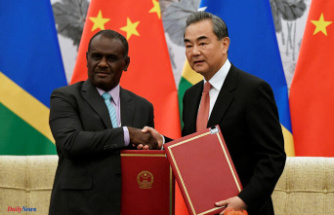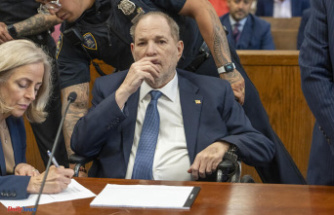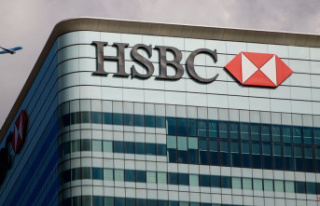Boris Johnson's nearly three years as Downing Street's chief executive have seen their fair share turbulent world events, including Russia's invasion in Ukraine, the Covid pandemic, and Brexit.
How is it that his resignation is being seen around the globe? We hear from our correspondents in their respective regions.
Is the EU laughing at Boris Johnson's fall? Yes, but also no.
In the past 24 hours, I have received numerous texts and phone calls from EU diplomats. They are filled with many question marks and exclamation points. European media headlines are filled with disdain, incredulity and disgust at the current political opera buffa (slapstick operetta performance) in the UK.
However, the EU view is often one of impatient disappointment. That's why Johnson was able to remain prime minister so long.
Many European countries, especially those in central and Eastern Europe, are extremely grateful to Boris Johnson's hardline stance against Russia. This was even before Vladimir Putin invaded Ukraine. They believe this to be a UK position which will continue even after Johnson is no longer prime Minister.
Few people in mainland Europe will be moved by the departure of Mr Johnson. He is being blamed by politicians for his incessant ranting about Brexit. They accuse him for not being open with the British people about the true implications of Brexit.
The bill to unilaterally revise the international post-Brexit treaty for Northern Ireland has been rejected by a large majority of parliamentarians. It is being rejected in mass quantities.
Despite this, I have not heard anyone in Brussels express any hope that Mr Johnson will be succeeded as UK prime minister. Many here believe that the resignations of Conservative ministers are career-saving efforts rather than evidence of their disagreement with Johnson's policies.
Keir Starmer, the opposition Labour leader, does not talk about reversing Brexit or significantly softening it.
Today's main EU hope is the same one I heard right after the 2016 Brexit vote. EU politicians want a UK leader who has the political confidence and the ability to negotiate with Brussels. They don't want to be distracted by the political gallery at home and play to it constantly.
You can read more about Katya here.
Joe Biden and the Democrats that control the US government will not be too upset by Boris Johnson's fall from grace. Some may even celebrate the news that made headlines in the US.
A statement that Mr Biden released to CBS News US media partner CBS News on Thursday stated that the "special relationship” between the US US and UK "remains strong, enduring", but did not mention Mr Johnson. The British embattled man didn't get a "we wish he best of luck in all his future endeavors" message.
The American president has never been a fan his British counterpart. He disagreed with him on Brexit's wisdom and expressed concern about the situation his Irish ancestral homeland is in.
True, Mr. Biden relied on Mr. Johnson to support him in his efforts to unite Europe in a response to Russian aggression in Ukraine.
They have also worked together to combat rising Chinese influence in Pacific.
However, many Democrats see Mr. Johnson and Donald Trump as political peas in the pod. They have similar views on immigration and trade, and share similarly iconoclastic political instincts.
Their logic suggests that anything that is negative for Johnson will be bad for Trump and his Republican allies. Anything that harms Donald Trump is good news for the Democrats.
However, Mr Biden might want to pause as Mr Johnson's undoing may have less in common than his political disposition.
The scandals that led to Mr Johnson's fall were not the only reason. British Prime Minister Tony Blair had seen his political standing shaken by the economic uncertainty, rising inflation, and social discord that plague Western democracies.
There is no easy solution, whether it's in the UK or the US. They may all reap the benefits of public discontent with current status quo.
The American Left may be happy to see Mr Johnson's final reckoning but his departure could spell doom not only for the Republicans in power, but also for those who are watching from the sidelines and the man who is contemplating a Mar-a-Lago political revival.
People who are keenly following British politics in Africa will notice a common theme emerging from the early reactions to Boris Johnson's resignation as party leader, and prime minister, within a few months: envy.
Social media users have expressed concern about how rare it is for leaders to resign or for their party to forcibly leave because of poor performance.
They used his resignation as a way to criticize the apparent lack of accountability by politicians in their countries to the people they govern.
However, it is important to note that Johnson was not seen as an African friend during his term. His departure was not unexpected.
This is huge news in countries such as Australia, India and Malaysia, as well as here in Singapore. These are all countries that have historical connections to the UK and inherited their system of parliamentary government as part of their previous colonies.
More than one commentator asked the question: What kind of signal does the UK send about democracy to the rest the world when, even after several of his coworkers have asked him to step down – ostensibly to the good of the country-- the leader initially refused?
Are you imagining the gradual decline of democracy?
Geopolitics is also being questioned, with the war in Ukraine. It's also possible that this could affect geopolitics.












